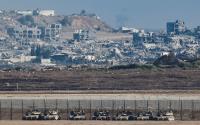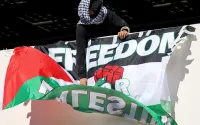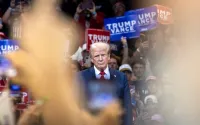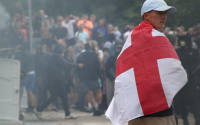Published on Wednesday, March 12, 2003 by Agence France Presse
As the United States prepared to press the UN Security Council into a vote on war with Iraq before the end of the week, Washington was looking increasingly isolated on the world stage and may even have to gear up for an assault on Baghdad without the military back-up of its staunchest ally, Britain.
German Greenpeace activists rappel from Berlin's landmark Brandenburg Gate to unveil a banner March 10, 2003. The German government believes a majority on the U.N. Security Council back a joint call by France, Russia and Germany for weapons inspections in Iraq to continue, a foreign ministry spokesman said. (Alexandra Winkler/Reuters) The majority of the 28 speakers who addressed the public meeting of the Security Council on Tuesday, were opposed to war and there was further support for an extension of the deadline for Iraq to disarm from India and Pakistan.
One of the few crumbs of comfort for the Americans came from Japan, who are not, however, currently members of the Security Council and so have no influence on the outcome of the vote.
US Defense Secretary Donald Rumsfeld admitted for the first time that fierce opposition to war in Britain, and especially in the ranks of Prime Minister Tony Blair's own government, might force the Americans to start the war alone.
The Security Council debate revealed that the smaller countries on the Council would refuse to back a US-British-Spanish motion calling for a March 17 deadline against Iraq and Washington indicated it could ease its stance.
President George W. Bush "thinks that there is a little room for a little more diplomacy, but not much time," White House spokesman Ari Fleischer said Tuesday.
A senior US official said Washington was preparing a compromise resolution for the UN Security Council, and Fleischer would not rule out that negotiations could lead to the inclusion of disarmament benchmarks for Iraq to follow if it is to avert war.
But he insisted that "the vote will take place this week" regardless of French and Russian veto threats.
South African ambassador Dumisani Kumalo and his Canadian counterpart, Paul Heinbecker, were among the speakers who warned that military action without the authority of the council would further strain already tense international relations and put the future of the UN itself in doubt.
Iraqi ambassador Mohammed Al-Douri was also left virtually alone in his assertion that the goal of the United States and its ally, Britain, was to seize Iraq's oil and redraw the map of the Middle East.
Indian Prime Minister Atal Behari Vajpayee urged the Security Council to give Iraq more time to disarm before an attack and warned that any unilateral action would leave the council "deeply scarred".
It was the first time New Delhi had expressed a clear position on the looming debate in the Security Council on the Iraqi crisis.
"The Security Council should give more time," he said. "We hope that the Security Council members will consider this."
Any action against Iraq, he said, should be through consensus in the Security Council.
"If unilateralism prevails, the UN would be deeply scarred with disastrous consequences for the world order," Vajpayee said.
Pakistani Prime Minister Zafarullah Jamali also called for an extension of the deadline. In "an appeal to the United Nations, to the countries in the world", Jamali said: "More time for peace should be given to Iraq."
In Japan, Chief Cabinet Secretary Yasuo Fukuda said Tokyo opposed moves to extend the March 17 deadline for Iraq to disarm.
"We appreciate (the Security Council's) efforts to achieve international cooperation, but we don't think our country can go along with the plan," Fukuda said. "Do we just wait? The effectiveness of an extension of the term is questionable," he said.
US Defense Secretary Rumsfeld said the United States had drawn up alternative plans in case Britain, which has also sent troops to the Gulf, did not take part in an invasion.
He said Britain's final decision was not clear and told reporters: "To the extent they (Britain) are not able to participate, there are works around, and they would not be involved."
However, Rumsfeld appeared to backtrack later in the day, saying: "I have no doubt of the full support of the United Kingdom for the international community's efforts to disarm Iraq.
British officials brushed off Rumsfeld's earlier comments.
"We are still working hard to get a second resolution," a spokeswoman for the British mission to the United Nations said. "We are not yet at the stage of military action. There has been total cooperation between the two sides on military planning."
A large majority of British public opinion and part of the ruling Labour Party are opposed to war without Security Council authority.
Australian Prime Minister John Howard was meanwhile facing a similar opposition at home over his pro-US stance.
Howard's deployment of 2,000 Australian troops to join US forces massing in the Gulf has fueled the biggest protest demonstrations since the Vietnam war in the 1970s and the resignation of intelligence analyst Andrew Wilkie in protest has fueled calls for Howard's resignation.
"We know the prime minister hasn't been listening to the Australian people, now he's not even listening to his own expert advice," said opposition Labor Party leader Simon Crean.






